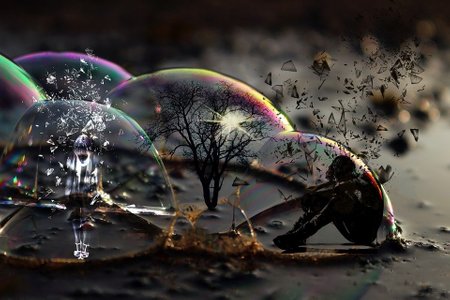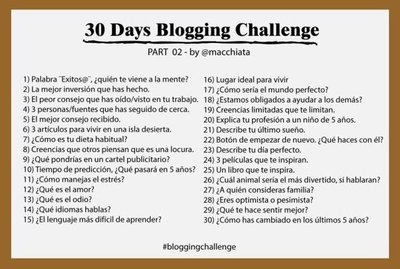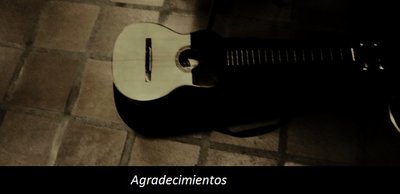Treceavo día del 2do reto / Thirteenth day of the 2nd challenge


Espanish
A veces es difícil escribir las primeras palabras para cualquier publicación, sobre todo cuando son cosas que nunca nos hemos puesto a analizar, y otras veces el tema propuesto para la siguiente publicación en este reto nos lo conocemos bastante bien y lo dominamos tanto que el material sale solo, y toma forma propia. En cualquiera de las dos situaciones tenemos la oportunidad de aprender y poner en práctica muchas cosas para mejorar nuestra calidad de blogging en esta plataforma, y es algo que siempre agradeceré a quienes organizan y ejecutan estos retos.
Muchas gracias a todos por el apoyo recibido en todo este tiempo, no siempre es tan fácil ser tan constante pero vale la pena intentarlo e integrarse a este gran comunidad con bastantes cosas valiosas que ofrecernos. Disfruten de este siguiente material realizado para todos ustedes con cariño.
English
Sometimes it is difficult to write the first words for any post, especially when they are things that we have never analyzed, and other times the topic proposed for the next post in this challenge we know it quite well and we master it so well that the material comes out by itself, and takes its own form. In either situation we have the opportunity to learn and put into practice many things to improve our quality of blogging on this platform, and it is something I will always be grateful to those who organize and execute these challenges.
Thank you very much to everyone for the support received during all this time, it is not always so easy to be so constant but it is worth it to try and join this great community with many valuable things to offer us. Enjoy this next material made for all of you with love.

Foto de Lars_Nissen en Pixabay - Photo of Lars_Nissen in Pixabay

Espanish
Definitivamente es de proporciones considerables el grupo de las cosas de esta vida que creemos entender, especialmente cuando nos dejamos llevar por energías muy grandes como las emociones, las circunstancias, y las experiencias personales. Estas últimas considero que sirven como basamento para sostener las ideas siempre y cuando hayamos profundizado y escudriñado las cosas que sean objeto de nuestra opinión, porque una experiencia sin la acción de observar y analizar las cosas nos puede hacer caer en la trampa de la superficialidad y la parcialidad.
Comúnmente se tiende a crear y darle vida a la imagen de que el odio es todo lo contrario del amor, lo que nos hace verlo prácticamente como un simple antónimo, y por esto me he dado cuenta de que hay mucha gente que cree que siente odio solo porque no puede sentir tolerancia, o porque algo o alguien no le cae bien, o porque simplemente no nos gusta algo o alguien. Pero al igual que el amor, el odio es mucho más que un simple sentimiento. Podemos sentir muchas cosas en esta vida sin generar ninguna contundencia importante.
De hecho sería muy interesante que en lugar de enfocarnos solo en las diferencias que separan el amor del odio, las cuales son bastante notorias y obvias, deberíamos también pasear nuestra observación por los puntos donde se correlacionan estos dos sentimientos. Si lo hiciéramos nos daríamos cuenta de lo mucho que tenemos que aprender sobre estos sentimientos.
English
It is definitely of considerable proportions the group of things in this life that we think we understand, especially when we let ourselves be carried away by very great energies such as emotions, circumstances, and personal experiences. These last ones I consider that they serve as a basis to sustain the ideas as long as we have deepened and scrutinized the things that are the object of our opinion, because an experience without the action of observing and analyzing things can make us fall into the trap of superficiality and partiality.
Commonly we tend to create and give life to the image that hate is the opposite of love, which makes us see it practically as a simple antonym, and because of this I have realized that there are many people who believe that they feel hate only because they cannot feel tolerance, or because they do not like something or someone, or because they simply do not like something or someone. But just like love, hate is much more than just a feeling. We can feel many things in this life without generating any major forcefulness.
In fact it would be very interesting that instead of focusing only on the differences that separate love from hate, which are quite noticeable and obvious, we should also walk our observation through the points where these two feelings correlate. If we did so we would realize how much we have to learn about these feelings.

Según todo esto... ¿Qué es el odio?
Quiero empezar por algunas partes obvias. En la publicación anterior les dije que el amor se trata de crear o procurar el bienestar colectivo, y que ese bienestar debe comenzar en uno mismo. Entonces podemos partir de este hecho para darnos cuenta que el odio es un sentimiento que impulsa a destruir todo lo que cause bienestar al prójimo.
Esto de que el odio necesite un impulso, que en resumen de cuentas es la misma pasión que brinda energía al amor, nos presenta una primera correlación. Como estamos hablando de sentimientos entonces el impulso del que hablamos es una pasión que a cualquier nivel nos puede hacer sentir la necesidad de realizar algo según sea amor u odio lo que sintamos hacia alguien o algo.
Sobre esto me gustaría traer un concepto que una vez escuche decir al famoso psicólogo Carlos Fraga en su programa La Vida es Hoy. El plantea que el amor comienza cuando aparecen dos elementos clave para este sentimiento, atención y tiempo.
Son dos cosas que dedicamos enteramente a alguien o algo y que cultivan o alimentan este sentimiento. Ese impulso del que les hablo se apoya en estas dos condiciones fundamentales para crear uno de estos dos sentimientos, por lo que si en el amor brindamos atención y tiempo para hacer cosas buenas y constructivas para el colectivo, en el odio dedicamos nuestra atención y el tiempo exactamente para destruir. Por esto es que no me gusta hablar del amor y el odio como si fueran simples términos antónimos entre sí, porque esa visión tan estrecha y limitada no nos permite ver más cosas importantes que también nos afectan. En todo caso prefiero la imagen de dos polos opuestos que emanan diferente energía, y la canalizan diferente, pero que desde la naturaleza y la ubicación están correlacionados.
La gente suele decir muy a la ligera que odian a otras personas solo porque les caen mal, o porque no comparten sus ideales, o porque estas personas hicieron algo malo, pero a la hora de demostrarlo no hacen nada más que quejarse y despotricar sobre esas personas........ Y que bueno que todo quede ahí, gracias a Dios.
Pero estos resentimientos no son para nada saludables, y si los padecemos será muy crucial preocuparse por aprender a vivir el proceso, y así dando paso al perdón, no para salir a abrazar a esas personas sino para procurar nuestro propio bienestar.
According to all this... What is hate?
I want to start with some obvious parts. In the previous post I told you that love is about creating or procuring collective well-being, and that well-being must begin in oneself. So we can start from this fact to realize that hate is a feeling that drives us to destroy everything that causes well-being to others.
The fact that hatred needs an impulse, which in short is the same passion that gives energy to love, presents us with a first correlation. As we are talking about feelings, then the impulse we are talking about is a passion that at any level can make us feel the need to do something depending on whether we feel love or hate towards someone or something.
About this I would like to bring a concept that I once heard the famous psychologist Carlos Fraga say in his program Life is Today. He states that love begins when two key elements for this feeling appear, attention and time.
These are two things that we dedicate entirely to someone or something and that cultivate or feed this feeling. That impulse I am talking about relies on these two fundamental conditions to create one of these two feelings, so if in love we give attention and time to do good and constructive things for the collective, in hate we dedicate our attention and time exactly to destroy. This is why I do not like to talk about love and hate as if they were simply antonyms of each other, because such a narrow and limited vision does not allow us to see more important things that also affect us. In any case I prefer the image of two opposite poles that emanate different energy, and channel it differently, but that from nature and location are correlated.
People usually say very lightly that they hate other people just because they dislike them, or because they do not share their ideals, or because these people did something wrong, but when it comes to prove it they do nothing but complain and rant about those people......... And it's a good thing that everything stays there, thank God.
But these resentments are not healthy at all, and if we suffer from them it will be very crucial to worry about learning to live the process, and thus giving way to forgiveness, not to go out to embrace those people but to seek our own welfare.

Foto de Victoria_Borodinova en Pixabay - Photo of Victoria_Borodinova in Pixabay

Alimentar el resentimiento puede llevarnos a dos cosas a largo plazo............. Nos lleva a contraer alguna enfermedad terrible que derrumbe toda nuestra vitalidad y productividad, haciéndonos caer en la ruina, y hasta en la muerte (como muchos casos que hay en el mundo). O puede pasar algo más terrible, que el odio de verdad nazca y nos haga cometer errores que pueden arruinar nuestra vida, y la vida de quienes nos rodean..... Incluso podemos dañar a esas personas que odiamos. El odio se trata precisamente de destruir con una causa o sin una causa, porque esa pasión que llevamos, que en este caso sería una pasión negativa, es la que nos va a impulsar a cometer actos terribles que pueden dejar daños irreparables. Es decir que quien odia es una auténtica bomba de tiempo que amenaza con destruir todo a su paso hasta llegar a su enemigo y destruirlo.
El odio puede ser infundado por muchos motivos, desde el egoísmo y la codicia, la envidia, hasta cosas más psicóticas como el fanatismo y el rencor por algún evento no superado. Una diferencia notable con el amor que normalmente no se comenta mucho es el radicalismo que le da forma al odio, ya que como este sentimiento se trata de solo destruir, entonces se necesita un objetivo para descargar ese sentimiento y declararlo rotundamente como nuestro enemigo.
Y a un enemigo no se le puede combatir con simples frasecitas ofensivas, o consignas ideológicas (estas solo alimentan la doctrina en un determinado individuo). A un enemigo se le combate en función de destruirlo e imponer nuestra fuerza, o de lo contrario según lo que nos haga creer el odio, ese enemigo nos destruirá a nosotros.
Feeding resentment can lead to two things in the long run............. It leads us to contract some terrible disease that collapses all our vitality and productivity, making us fall into ruin, and even death (as there are many cases in the world). Or something more terrible can happen, that hatred is really born and makes us make mistakes that can ruin our life, and the life of those around us...... We can even harm those people we hate. Hatred is precisely about destroying with a cause or without a cause, because that passion that we carry, which in this case would be a negative passion, is the one that will drive us to commit terrible acts that can leave irreparable damage. That is to say that whoever hates is a real time bomb that threatens to destroy everything in its path until it reaches its enemy and destroys him.
Hate can be unfounded for many reasons, from selfishness and greed, envy, to more psychotic things like fanaticism and resentment for some event not overcome. A notable difference with love that is usually not much discussed is the radicalism that shapes hate, because as this feeling is only about destroying, then a target is needed to unload that feeling and declare it outright as our enemy.
And an enemy cannot be fought with simple offensive phrases, or ideological slogans (these only feed the doctrine in a certain individual). An enemy is fought in order to destroy him and impose our strength, or else, depending on what hatred makes us believe, that enemy will destroy us.

Foto de Pixabay en Pexels - Photo of Pixabay in Pexels

La historia universal nos ha dado miles de ejemplos donde el odio ha cobrado muchas vidas inocentes y ha destruido a muchos pueblos, entre otras acciones terriblemente radicales y hasta enfermizas que se han llevado a cabo, y que si nos ponemos a enumerar y analizar entonces esta publicación no podría terminar. En cambio con el amor es ilógico obsesionarse con una persona así sea para llenarla de amor y ternura, porque el amor no tiene nada que ver con actitudes o formas de sentir que rayen en lo enfermizo. El amor simplemente fluye y deja que los demás fluyan a su ritmo.
Hay mucha gente que cree en ese equivocado dicho popular que reza que “del amor al odio solo hay un paso”, porque estas personas creen que odian a otros solo por cuestiones muy superficiales, y que afectan únicamente sus propios egos. Con todo el respeto que la gente merece creo que es demasiado ingenuo pensar que un sentimiento tan nocivo, altamente peligroso y hasta mortal pueda dar paso a una contraparte tan compleja como el amor.
Las pasiones que implican cada uno de estos sentimientos hacen imposible una transición como esa. Si una persona nos dice hoy que nos ama y al día siguiente nos agrede y hace cosas para destruirnos entonces obviamente ese amor nunca fue verdadero. Un hombre que después de decirle de mil maneras a su mujer cuanto la amaba, se dedique ahora a golpearla y agredirla claramente nunca sintió ningún amor por su pareja.
Universal history has given us thousands of examples where hatred has claimed many innocent lives and destroyed many peoples, among other terribly radical and even sick actions that have been carried out, and that if we start to enumerate and analyze then this publication could not finish. On the other hand, with love it is illogical to become obsessed with a person, even if it is to fill him or her with love and tenderness, because love has nothing to do with attitudes or ways of feeling that border on the unhealthy. Love simply flows and lets others flow at their own pace.
There are many people who believe in that mistaken popular saying that "from love to hate there is only one step", because these people believe that they hate others only because of very superficial issues, and that only affect their own egos. With all the respect that people deserve, I think it is too naive to think that such a harmful, highly dangerous and even deadly feeling can give way to such a complex counterpart as love.
The passions involved in each of these feelings make such a transition impossible. If a person tells us today that he loves us and the next day he assaults us and does things to destroy us, then obviously that love was never true. A man who after telling his wife in a thousand ways how much he loved her, now devotes himself to beating and assaulting her clearly never felt any love for his partner.

En resumen, el odio es más que sentirse molesto con determinada persona, y muchas veces por cuestiones tan simples y solucionables. Es un sentimiento altamente tóxico y nocivo para quien lo porta, y que puede desencadenar una gran destrucción no solo para esa persona odiada o elemento odiado, sino también para todo lo que esté a su paso, incluyendo a las personas más cercanas. Y es a este punto al que debemos evitar llegar.
Mi llamado es para que todos nos hagamos responsables por nuestros sentimientos y emociones, tomando el control de todas estas cosas que son maravillosas pero que sin una mano despierta al volante puede ocasionar un terrible accidente en nuestras vidas. Si tenemos un resentimiento contra alguien lo adecuado es revisar eso que sentimos, y ver que es lo que nos impide perdonar realmente, para comenzar a trabajar en pro de cambiar esa realidad.
Puedo afirmar con responsabilidad que una gran mayoría de estos problemas tienen que ver con nuestro ego y la madurez con la que podamos dejar ir esas cosas que no tienen solución, y que ante esa situación lo que hay que hacer es buscarle la vuelta a las cosas, creando alternativas y oportunidades de crecimiento personal. No vamos a ser mejores que las personas que nos hacen daño devolviéndoles el mismo mal duplicado, y mucho menos podremos arreglar los problemas de esa manera.
Siempre habrá opciones más inteligentes para asumir los problemas que tienen solución, y evitar caer en cosas verdaderamente perjudiciales para nosotros y para todos los que nos rodean.
Como decimos aquí en Venezuela.... El toro hay que tomarlo por los cachos.
In short, hatred is more than feeling annoyed with a certain person, and many times for such simple and solvable issues. It is a highly toxic and harmful feeling for those who carry it, and that can trigger a great destruction not only for that hated person or hated element, but also for everything that is in its path, including the closest people. And it is at this point that we must avoid reaching.
My call is for all of us to take responsibility for our feelings and emotions, taking control of all these things that are wonderful but without an awakened hand at the wheel can cause a terrible accident in our lives. If we have a resentment against someone the right thing to do is to review what we feel, and see what it is that prevents us from really forgiving, to start working towards changing that reality.
I can affirm with responsibility that a great majority of these problems have to do with our ego and the maturity with which we can let go of those things that have no solution, and that in that situation what we have to do is to look for a way to turn things around, creating alternatives and opportunities for personal growth. We are not going to be better than the people who hurt us by giving back to them the same evil duplicated, and much less will we be able to fix the problems that way.
There will always be smarter options to take on problems that have solutions, and avoid falling into things that are truly harmful to us and to all those around us.
As we say here in Venezuela .... The bull must be taken by the horns.
Enlaces de mis entradas anteriores en el Blogging Challenge 2
- Palabra exitosa / Successful word - Día 1 Reto 2 del Blogging Challenge.
- La mejor inversión que he hecho / The best investment I have ever made - Día 2 Reto 2 del Blogging Challenge.
- El peor consejo que he escuchado en mi trabajo / The worst advice I have ever heard in my job - Día 3 Reto 2 del Blogging Challenge.
- Tres personas que he seguido de cerca / Three people I have followed closely - Día 4 Reto 2 del Blogging Challenge.
- El mejor consejo recibido / The best advice received - Día 5 Reto 2 del Blogging Challenge.
- 3 artículos para vivir en una isla desierta / 3 items for living on a desert island - Día 6 Reto 2 del Blogging Challenge.
- ¿Como es mi dieta habitual? / How is my regular diet?.
- Creencias que otros piensan que es una locura / Beliefs that others think are crazy - Día 8 Reto 2 del Blogging Challenge.
- ¿Qué pondría en un cartel publicitario? / What would I put on a billboard? - Día 9 Reto 2 del Blogging Challenge.
- Tiempo de predicción ¿Que pasará en 5 años? / Prediction time. What will happen in 5 years? - Día 10 Reto 2 del Blogging Challenge.
- ¿Que es el amor? / What is love? - Día 12 Reto 2 del Blogging Challenge.
Foto de @blogging-team


Muchas gracias a toda la comunidad Smile por traer estas novedosas iniciativas a esta plataforma creando estos maravillosos resultados. Y muchas gracias a todos ustedes por su valioso apoyo.
¡Saludos!
Thank you very much to the entire Smile community for bringing these innovative initiatives to this platform creating these wonderful results. And many thanks to all of you for your valuable support.
Regards!

Créditos: - Foto de la portada, separadores, banner y firma hechos por @juanmanuellopez1 con los editores Power Point y Paint.
- Logo en la portada del proyecto @blogging-team para la comunidad Smile.
- Cover photo, separators, banner and signature made by @juanmanuellopez1 with Power Point and Paint editors.
- Logo on the cover of the project @blogging-team for the Smile community.

- La mejor inversión que he hecho / The best investment I have ever made - Día 2 Reto 2 del Blogging Challenge.

